
Mom Rage: Signs, Causes, Treatments, & Ways to Cope
Motherhood is a beautiful journey filled with love, joy, and cherished moments, but it’s also full of challenges and frustrations.
Despite the idealized image of mothers as endlessly patient and nurturing, the reality is that many moms experience moments of overwhelming anger that can catch them off guard and leave them feeling guilty and ashamed.
Mom rage, or maternal rage or maternal anger, is a common yet often misunderstood phenomenon. It describes the intense fits of anger that mothers may experience, seemingly out of nowhere, in response to the stressors and demands of parenting.
Anger can range from mild irritation to explosive anger, leaving mothers feeling out of control and overwhelmed.
In this blog, we will understand the complexities of mom rage, exploring its underlying causes, symptoms, and effects on both mothers and their families.
By understanding the triggers of mom rage and learning effective coping strategies, mothers can regain a sense of control and emotional balance.
From practicing self-compassion to setting boundaries in relationships, various tools and techniques can help moms navigate their anger healthily and constructively.
What Is Mom Rage?

Mom rage, also known as maternal anger, refers to the anger issues experienced by mothers, often arising unexpectedly and disrupting daily life.
Contrary to the idealized portrayal of motherhood as patient and nurturing, mom rage manifests as intense bursts of anger that can leave women feeling out of control and guilty afterward. This phenomenon, though not new, has gained recognition due to societal pressures and the expectation for mothers to suppress anger.
Mom rage differs from typical anger in intensity and unpredictability, often catching mothers off guard as it escalates rapidly. Symptoms include verbal or physical outbursts, frustration, and loss of control.
Triggers for mom rage can be minor, such as a crying baby or a messy home, compounded by the constant stress of caring for children and managing household responsibilities. Guilt and shame often follow these outbursts, further contributing to the cycle of maternal anger.
Understanding the causes and symptoms of mom rage is crucial for mothers to identify strategies to cope and seek support when needed.
How Is Mom Rage Different From Normal Anger?
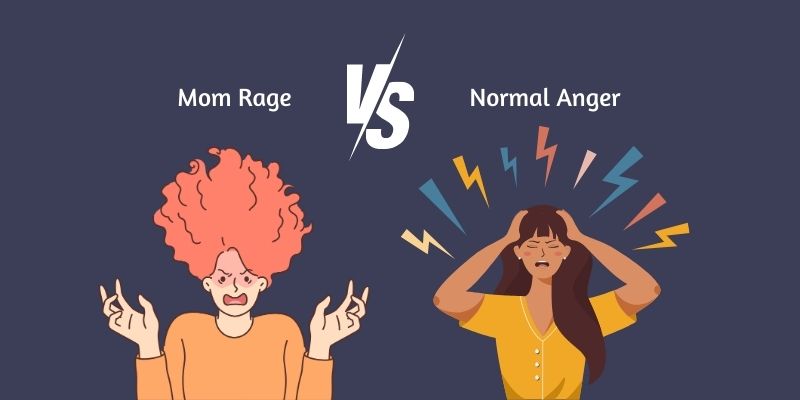
Mom rage differs from normal anger in intensity, sudden onset, and uncontrollable sense. While anger is a natural emotion experienced by everyone, mom rage feels like it crosses a severe threshold, often catching mothers off guard with its explosiveness.
It can be described as a type of anger that feels so intense it goes beyond the usual bounds of anger. It can arise unexpectedly, seemingly out of nowhere, and escalate rapidly, leaving mothers overwhelmed and out of control.
Unlike typical anger, which may be managed through coping mechanisms or rational thought processes, mom rage feels more like a primal reaction that bypasses rationality.
Mothers experiencing mom rage may find themselves lashing out verbally or physically, even if such behavior is uncharacteristic.
The triggers for mom rage can be seemingly minor events or inconveniences, such as a crying baby or a spilled drink. Still, they evoke a disproportionate response from the mother.
Additionally, mom rage often leads to guilt and shame after the outburst has passed, as mothers may struggle to reconcile their anger with societal expectations of maternal patience and kindness.
Recognizing the differences between mom rage and normal anger is crucial for mothers to address and manage this intense emotional experience effectively.
Who Gets to Experience Mom Rage?
Mom rage, also known as maternal rage or maternal anger, is a phenomenon that can affect any parent, regardless of their personality or usual temperament.
While some mothers may be naturally more easygoing or low-key, they are not immune to experiencing intense fits of anger in certain situations with their children.
Historically, societal norms have encouraged women, especially mothers, to suppress or deny feelings of anger, which can make the experience of mom rage even more surprising and unsettling when it does occur.
The pressure to conform to idealized notions of perfect motherhood, combined with the expectation always to be patient and nurturing, can contribute to feelings of guilt and inadequacy when a mother experiences rage.
Furthermore, the relentless demands of motherhood, coupled with the lack of recognition and support for the emotional labor involved, can exacerbate feelings of overwhelm and frustration, leading to episodes of mom rage.
This emotional experience is not limited to any specific demographic or socioeconomic group but can affect mothers from all walks of life.
Mothers need to recognize that experiencing mom rage is a relatively common phenomenon and that seeking help and support is a proactive step toward managing and coping with these intense emotions.
By acknowledging the universality of mom rage, mothers can begin to address its underlying causes and develop effective strategies for self-care and emotional regulation.
How Does Mom Rage Feel?
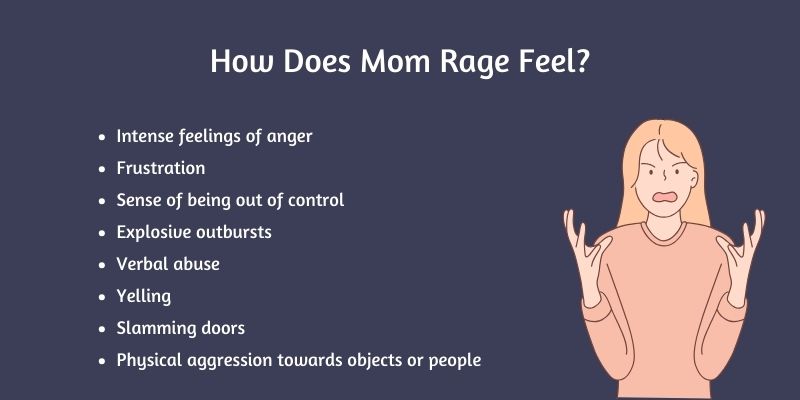
Mom rage can be an overwhelming and distressing experience characterized by intense feelings of anger, frustration, and a sense of being out of control.
Unlike normal anger, which can be managed or suppressed, mom rage often feels like it crosses a threshold of severity, leading to explosive outbursts that may seem uncontrollable.
The onset of mom rage can be sudden and unexpected, catching mothers off guard and leaving them feeling overwhelmed by the intensity of their emotions.
It may manifest as verbal or physical lashing out, such as yelling, slamming doors, or even physical aggression towards objects or people.
These outbursts can be triggered by seemingly minor incidents, such as a child’s misbehavior or a disruption to routine, but they can escalate rapidly, leaving mothers feeling like they are on the verge of snapping.
In addition to the immediate emotional release of anger, mom rage often leaves mothers with lingering feelings of guilt and shame. Cultural expectations of motherhood as a serene and nurturing role can compound these feelings, leading mothers to question their ability to fulfill this idealized image.
The experience of mom rage can also strain relationships with children and partners, as the unpredictable nature of the outbursts can create an atmosphere of tension and fear.
Mom rage is a complex and distressing emotional experience that can have significant impacts on mothers and their families.
Recognizing the signs and symptoms of mom rage is an essential first step toward seeking help and finding healthier ways to cope with intense emotions.
Where Does Mom’s Rage Come From?
Mom rage can stem from a variety of internal and external factors that contribute to feelings of overwhelm, frustration, and anger in mothers.
One major factor is the overwhelming nature of motherhood itself, as mothers often feel responsible for the well-being of their children while juggling numerous other responsibilities. The constant pressure to meet societal expectations of the “perfect” mother can exacerbate feelings of inadequacy and frustration when reality falls short.
Lack of support is another significant contributor to mom rage, as mothers may feel isolated and overwhelmed by childcare demands without adequate assistance from partners, family members, or friends.
Gender-related inequalities in parenting responsibilities can also fuel feelings of resentment and anger, particularly in households where mothers bear the majority of childcare duties.
Additionally, physical and hormonal changes associated with pregnancy, childbirth, and postpartum recovery can impact mothers’ emotional well-being, leading to mood swings, irritability, and heightened stress levels.
Sleep deprivation, financial strain, and relationship conflicts can further exacerbate feelings of anger and frustration, creating a perfect storm for mom rage to manifest.
Furthermore, unresolved grief or loss related to changes in identity and lifestyle after becoming a mother can contribute to feelings of resentment and anger.
Mothers who feel that their emotional needs are not being met or that their contributions are not valued may also experience heightened feelings of frustration and hopelessness, adding to the intensity of mom rage.
Overall, mom rage is a complex phenomenon influenced by psychological, social, and environmental factors that vary from individual to individual.
Recognizing and addressing these underlying causes is essential for mothers to manage their emotions and seek support when needed effectively.
What Are the Symptoms of Mom Rage?
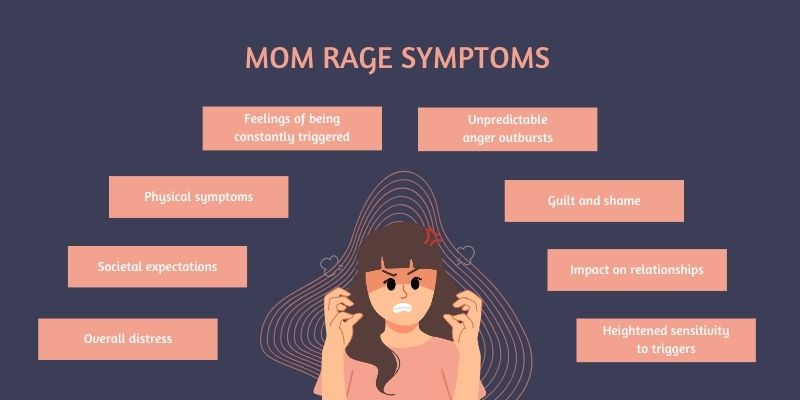
Mom rage is characterized by various symptoms that vary in intensity and duration but generally involve overwhelming feelings of anger, frustration, and loss of control.
These symptoms often manifest suddenly and unexpectedly, catching mothers off guard and leaving them feeling ashamed or guilty afterward.
- Unpredictable anger outbursts: Mom rage often involves sudden and intense episodes of anger that may be triggered by seemingly minor incidents, such as a child’s misbehavior or household messes.
- Heightened sensitivity to triggers: Mothers experiencing mom rage may find themselves easily irritated or frustrated by everyday stressors, leading to a chronic state of tension and irritability.
- Feelings of being constantly triggered: Mothers may feel like they are always on edge, with even minor annoyances or inconveniences causing them to become overwhelmed or enraged.
- Guilt and shame: Following episodes of mom rage, mothers often experience feelings of remorse and self-criticism, worrying about the impact of their anger on their children and feeling inadequate as parents.
- Physical symptoms: Mom rage can also manifest with physical symptoms such as rapid heartbeat, sweating, trembling, or tension in the body, reflecting the intense emotional arousal experienced during anger outbursts.
- Societal expectations: The pressure to conform to societal expectations of being patient and nurturing mothers can exacerbate guilt and shame, as mothers may feel like they are failing to live up to these ideals.
- Impact on relationships: Mom rage can strain relationships with children and partners, leading to feelings of fear, resentment, and anxiety among family members. It may also contribute to a cycle of conflict and disconnection within the family unit.
- Overall distress: The symptoms of mom rage can significantly impact a mother’s overall well-being, causing emotional distress and impairing her ability to cope with the demands of motherhood effectively. Recognizing and addressing these symptoms is essential for mothers to develop healthier coping strategies and improve their relationships with their families.
Overall, the symptoms of mom rage can significantly impact mothers’ well-being and relationships with their children and partners.
Recognizing these symptoms is an essential first step toward addressing underlying issues and developing healthy coping strategies to manage anger and frustration effectively.
What Are the Causes of Mom Rage?
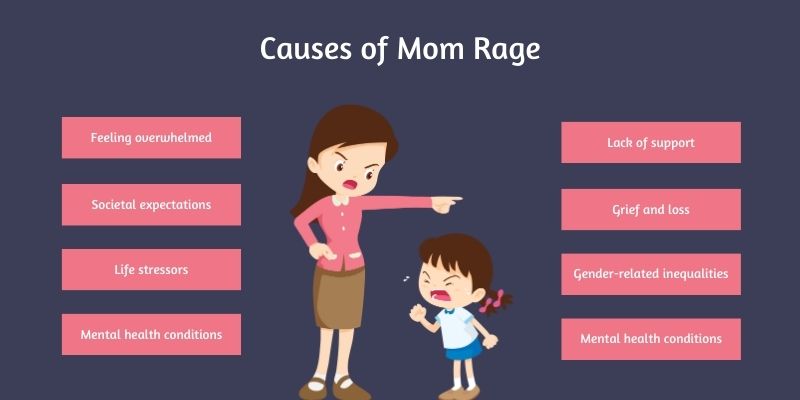
Mom rage, characterized by intense and unpredictable fits of anger experienced by mothers, can stem from various underlying causes, each contributing to the overwhelming emotional turmoil that mothers may experience.
One significant factor is the feeling of being overwhelmed. Mothers often juggle multiple responsibilities, including caring for their children, managing household tasks, and possibly holding down a job.
The sheer weight of these obligations can lead to a sense of being constantly overwhelmed, with little time or energy left for self-care.
- Feeling overwhelmed: Mothers often bear the weight of not only their own needs but also their children’s and families’ needs, leading to a sense of being constantly overwhelmed by responsibilities and demands.
- Lack of support: When mothers feel unsupported in their caretaking roles, whether due to a lack of assistance from partners or family members or feelings of inadequacy in asking for help, they may experience deep frustration and resentment.
- Grief and loss: Transitioning into motherhood can bring about significant changes in identity and lifestyle, leading some mothers to mourn the loss of their pre-motherhood selves, careers, or social networks, which can contribute to feelings of frustration and anger.
- Gender-related inequalities: In households with traditional gender roles, mothers may bear the brunt of childcare responsibilities, leading to feelings of resentment towards partners who may not share the workload equally.
- Mental health conditions: Mom rage can be a symptom of various mental health disorders, including postpartum depression, postpartum anxiety, stay-at-home mom depression, postpartum psychosis, and intermittent explosive disorder, among others.
- Life stressors: Financial difficulties, lack of adequate childcare, relationship conflicts, physical changes after childbirth, hormonal fluctuations, sleep deprivation, burnout, and unmet emotional needs are common stressors that can contribute to mom rage.
- Societal expectations: Cultural depictions of mothers as patient, nurturing, and self-sacrificing can create unrealistic expectations that may exacerbate feelings of guilt and shame when mothers struggle to meet these ideals. Recognizing these underlying causes is crucial for mothers to address the root issues contributing to their rage and develop effective coping strategies.
Overall, mom rage is a complex phenomenon influenced by a combination of factors, including societal expectations, lack of support, and mental health issues. Recognizing and addressing these underlying causes is essential for mothers to manage their anger and develop healthier coping mechanisms effectively.
How Is Mom Rage Diagnosed?
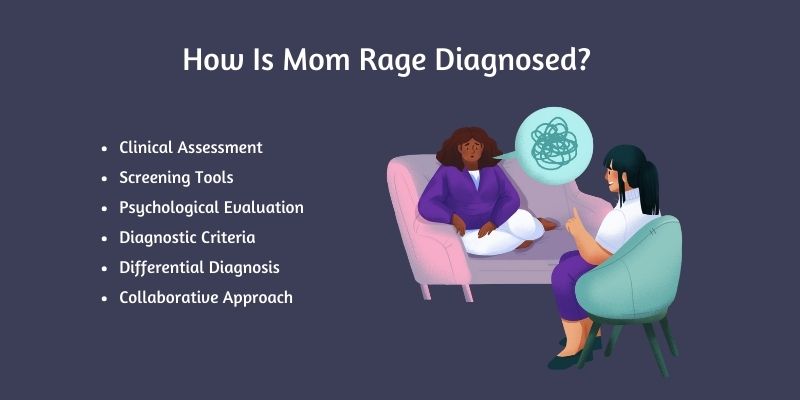
Mom rage, although a common experience among mothers, is not a clinical diagnosis. Instead, it often manifests as a symptom of underlying issues such as stress, depression, anxiety, or unresolved emotional trauma.
Therefore, diagnosing mom rage involves identifying and addressing these contributing factors through appropriate interventions.
- Clinical Assessment: Diagnosis of mom rage typically begins with a comprehensive clinical assessment conducted by a healthcare professional, such as a psychologist, psychiatrist, or counselor. This assessment involves gathering information about the mother’s medical history, current symptoms, and any underlying mental health conditions.
- Screening Tools: Healthcare providers may use standardized screening tools to assess the severity of the mother’s symptoms and determine if she meets the criteria for specific mental health disorders associated with anger and irritability, such as postpartum depression, postpartum anxiety, or intermittent explosive disorder (IED).
- Psychological Evaluation: A psychological evaluation may explore the mother’s thoughts, emotions, and behavioral patterns. This evaluation can help identify underlying psychological factors contributing to her anger, such as unresolved trauma, relationship conflicts, or maladaptive coping strategies.
- Diagnostic Criteria: Mom rage may be diagnosed as a symptom of various mental health disorders, depending on the specific characteristics and severity of the mother’s symptoms. For example, if the mother meets the criteria for postpartum depression or postpartum anxiety, mom rage may be considered a prominent symptom of these conditions.
- Differential Diagnosis: It’s essential to differentiate mom rage from other conditions that may present with similar symptoms, such as bipolar disorder, borderline personality disorder, or substance use disorders. A thorough evaluation helps rule out these conditions and ensure an accurate diagnosis.
- Collaborative Approach: Diagnosing mom rage often requires a collaborative approach involving multiple healthcare professionals, including therapists, physicians, and social workers. This interdisciplinary team can provide comprehensive support and tailored treatment interventions to address the mother’s underlying issues and improve her well-being.
Diagnosing mom rage involves a thorough clinical assessment, screening for mental health disorders, psychological evaluation, consideration of diagnostic criteria, and collaboration among healthcare professionals to address underlying factors contributing to the mother’s anger and distress.
How Is Mom Rage Treated?
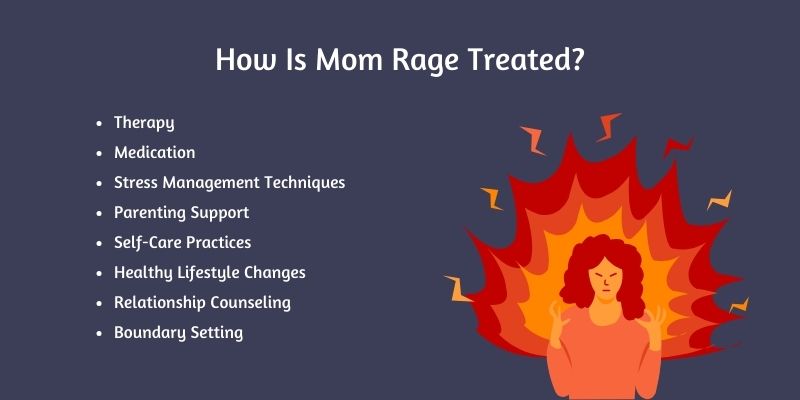
Treating mom rage involves addressing the underlying factors contributing to the mother’s anger and developing strategies to manage her emotions more effectively.
Here are several approaches commonly used in the treatment of mom rage:
- Therapy: Individual therapy, such as cognitive-behavioral therapy (CBT), dialectical behavior therapy (DBT), or psychodynamic therapy, can help mothers explore the root causes of their anger, develop coping skills, and learn healthier ways to manage stress and regulate their emotions. Therapy provides a safe space for mothers to express their feelings, gain insight into their thoughts and behaviors, and develop strategies for behavior change.
- Medication: In some cases, medication may be prescribed to address underlying mental health conditions contributing to mom rage, such as depression, anxiety, or mood disorders. Antidepressants, anti-anxiety medications, or mood stabilizers may be prescribed under the guidance of a psychiatrist or other healthcare provider.
- Stress Management Techniques: Learning effective stress management techniques can help mothers reduce their overall stress levels and cope more effectively with the demands of motherhood. Techniques such as mindfulness meditation, deep breathing exercises, progressive muscle relaxation, and yoga can promote relaxation, reduce tension, and improve emotional regulation.
- Parenting Support: Parenting education and support programs can provide mothers practical skills and strategies for managing challenging behaviors in their children, improving communication, setting boundaries, and fostering positive parent-child relationships. Parenting support groups or online forums can also offer emotional support and validation from other mothers experiencing similar challenges.
- Self-Care Practices: Encouraging mothers to prioritize self-care activities reduces stress and prevents burnout. Engaging in activities that promote relaxation, pleasure, and fulfillment, such as exercise, hobbies, socializing with friends, or spending time alone, can help mothers recharge and maintain their emotional well-being.
- Healthy Lifestyle Changes: Adopting a healthy lifestyle, including regular exercise, balanced nutrition, adequate sleep, and avoiding excessive alcohol or substance use, can support overall mental and physical health, reduce stress, and improve mood stability.
- Relationship Counseling: Addressing relationship conflicts and improving communication with partners or family members can help reduce interpersonal stressors contributing to mom rage. Couples therapy or family counseling can provide a supportive environment for addressing relationship issues and developing healthier ways of relating to one another.
- Boundary Setting: Establishing clear boundaries and assertively communicating needs and expectations with others can help mothers protect their well-being and reduce overwhelming feelings. Learning to say no to additional responsibilities or obligations and prioritizing self-care can empower mothers to manage their stress better and prevent burnout.
Treating mom rage involves a holistic approach that addresses underlying mental health issues, teaches coping skills, promotes self-care, and enhances parenting strategies.
By addressing these factors comprehensively, mothers can learn to manage their emotions more effectively and experience greater satisfaction and fulfillment in their role as parents.
How Does Mom Rage Affect Children & Partners?
Mom rage can have significant and lasting effects on children and partners, impacting their emotional well-being, relationships, and family dynamics.
Effects on Children
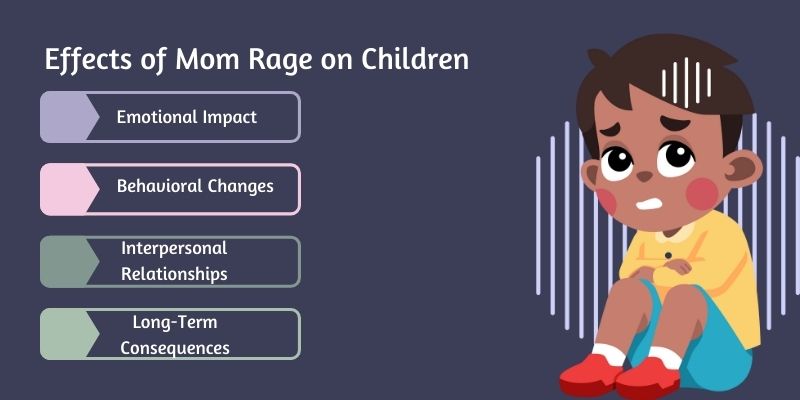
Angry moms suffering from mom rage can have a negative impact on the mental and physical health of children. Here are the common effects of mom rage on children:
- Emotional Impact: Children exposed to maternal rage may experience fear, confusion, and insecurity as they witness their mother’s unpredictable and intense outbursts of anger. They may internalize feelings of guilt, believing they are the cause of their mother’s anger, which can negatively impact their self-esteem and emotional development.
- Behavioral Changes: Children may develop maladaptive coping mechanisms in response to maternal rage, such as withdrawal, aggression, or seeking excessive reassurance. They may struggle with emotional regulation, leading to outbursts of their own or difficulty managing stress and frustration.
- Interpersonal Relationships: Growing up in an environment characterized by maternal rage can affect children’s ability to form healthy relationships and communicate effectively. They may struggle with trust, intimacy, and conflict resolution, impacting their relationships with peers, romantic partners, and eventually their children.
- Long-Term Consequences: Children exposed to chronic maternal anger may be at greater risk for mental health issues, such as anxiety, depression, and post-traumatic stress disorder (PTSD), as well as academic difficulties, substance abuse, and behavioral problems later in life.
Effects on Partners
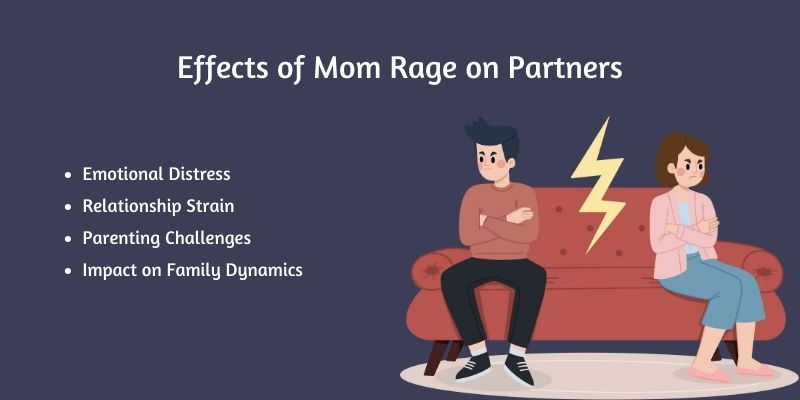
Mom rage not only has a severe adverse effect on children – it can also ruin relations by damaging the bond with the partner.
Here are the effects of mom rage on partners:
- Emotional Distress: Partners of mothers experiencing rage may experience feelings of helplessness, frustration, and inadequacy as they witness their loved one’s struggles with anger and emotional regulation. They may feel powerless to intervene or support their partner effectively, leading to guilt or resentment.
- Relationship Strain: Maternal rage can strain romantic relationships, causing tension, conflict, and a breakdown in communication between partners. Partners may feel misunderstood or unappreciated, leading to disconnect and dissatisfaction.
- Parenting Challenges: Partners may face challenges in co-parenting with a mother experiencing rage as they navigate differing parenting styles, conflicts over discipline, and concerns about the impact of maternal anger on their children. They may feel pressure to protect their children from harm while supporting their partner’s emotional well-being.
- Impact on Family Dynamics: Maternal rage can disrupt family dynamics and create a hostile or unstable home environment, affecting the well-being of all family members. Partners may struggle to maintain a sense of normalcy and stability in the face of ongoing conflict and emotional volatility.
Mom rage can have far-reaching consequences for both children and partners, affecting their emotional health, relationships, and overall quality of life.
10 Tips For Dealing With Mom Rage
Mom rage can be overwhelming, but effective strategies for managing it exist. By implementing these tips, you can regain control of your emotions and cultivate a healthier relationship with yourself and your family.
- Identify triggers
- Deep breathing
- Take a timeout
- Use ‘I’ statements
- Start journaling
- Set relationship boundaries
- Go for physical exercises
- Medication
- Opt for an anger management class
- Speak to a therapist
By incorporating these tips into your daily routine, you can effectively manage mom rage and foster a more peaceful and fulfilling family life.
1. Identify Triggers
Identifying triggers involves recognizing the specific situations, events, or circumstances that tend to provoke anger or frustration in mothers.
Triggers can vary widely from person to person. They may include stress, lack of sleep, unrealistic expectations, feeling overwhelmed by responsibilities, or unresolved past experiences.
By becoming aware of these triggers, mothers can anticipate when they will likely experience mom rage and develop strategies to cope with or avoid them altogether.
2. Deep Breathing
Deep breathing exercises are a simple yet powerful technique for managing anger and reducing stress in the moment.
Mothers can activate the body’s relaxation response and calm the nervous system by taking slow, deep breaths in through the nose and exhaling slowly through the mouth.
Deep breathing helps lower heart rate, reduce muscle tension, and promote calm and relaxation. This technique can be practiced anytime, anywhere, making it a convenient tool for managing mom rage during challenging situations.
3. Take a Timeout
Taking a timeout involves temporarily removing oneself from a stressful or triggering situation to regain composure and perspective.
This may involve physically leaving the room or stepping away from the situation mentally by focusing on calming activities such as deep breathing, visualization, or progressive muscle relaxation.
Timeouts allow mothers to cool down and collect their thoughts before responding impulsively out of anger.
By giving themselves space to process their emotions, mothers can prevent escalation of conflicts and make more rational decisions about addressing the situation.
4. Use ‘I’ Statements
Using “I” statements involves expressing thoughts, feelings, and needs assertively and directly without blaming or accusing others.
Instead of saying, “You always make me angry when you do that,” mothers can communicate their emotions more effectively by saying, “I feel frustrated when I’m interrupted while I’m working.” “I” statements help to take ownership of one’s emotions and experiences while promoting open and respectful communication with others.
By expressing themselves non-confrontationally, mothers can reduce tension and defensiveness in relationships and work towards finding constructive solutions to conflicts.
5. Start Journaling
Journaling is a therapeutic practice that involves writing down thoughts, feelings, and experiences to process emotions and gain insight into underlying triggers and behavior patterns.
Mothers can use journaling for self-reflection and self-awareness, exploring the root causes of their anger and identifying potential solutions.
By regularly documenting their thoughts and emotions, mothers can track changes over time and identify effective coping strategies for managing mom rage.
6. Set Relationship Boundaries
Setting relationship boundaries involves establishing clear and healthy limits on behavior and interactions with others to protect one’s emotional well-being and maintain respect in relationships.
Mothers can communicate their needs, preferences, and expectations to family members, friends, and partners, setting boundaries around personal space, communication styles, and responsibilities.
By setting and enforcing boundaries, mothers can prevent resentment, burnout, and conflicts contributing to mom rage, promoting healthier and more fulfilling relationships.
7. Go for Physical Exercises
Physical exercise is a powerful way to release pent-up energy and tension, reduce stress hormones, and improve mood and overall well-being.
Mothers can incorporate regular anger management exercise into their daily routine, choosing activities that they enjoy and that fit their schedule and fitness level.
Whether going for a brisk walk, practicing yoga, or participating in a group fitness class, exercise provides a natural outlet for releasing anger and frustration while promoting physical health and mental clarity.
8. Medication
In some cases, medication may be prescribed to help manage symptoms of mom rage, mainly if underlying mental health conditions such as depression, anxiety, or mood disorders are present.
A healthcare provider may recommend antidepressants, anti-anxiety medications, or mood stabilizers to help stabilize mood and reduce symptoms of irritability, anger, and impulsivity.
It’s essential for mothers to discuss the potential benefits and risks of medication with their healthcare provider and to follow their treatment plan closely for optimal results.
9. Opt for an Anger Management Class
Anger management classes or therapy programs offer structured support and guidance for individuals struggling with excessive anger or aggressive behavior.
Anger management classes by Mastering Anger teach participants practical skills and techniques for recognizing triggers, managing emotions, and resolving conflicts in healthy and constructive ways.
By participating in anger management classes, mothers can learn effective coping strategies, improve communication skills, and gain insight into the underlying causes of their anger, ultimately reducing mom rage and improving overall well-being.
10. Speak to a Therapist
Speaking to a therapist or counselor provides mothers with a safe and confidential space to explore their feelings, address underlying issues, and develop personalized strategies for managing mom rage.
Therapists can offer empathy, support, and validation, helping mothers gain perspective on their experiences and develop healthier coping mechanisms.
Through individual therapy sessions, mothers can learn to identify and challenge negative thought patterns, improve self-regulation skills, and build resilience in the face of stressors.
Therapists may also provide referrals to additional resources or support services as needed, ensuring comprehensive care for mothers experiencing mom rage.
Conclusion
Mom rage is a common and often misunderstood phenomenon that many mothers experience in their journey of parenthood. It is essential to recognize that feeling angry or frustrated as a parent is normal and does not make someone a bad parent.
However, when mom rage becomes overwhelming and interferes with daily life, it is crucial to seek support and implement coping strategies to manage these intense emotions effectively.
By understanding the triggers and underlying causes of mom rage, mothers can develop proactive strategies to address and mitigate these feelings.
From practicing deep breathing exercises to setting boundaries in relationships and seeking professional help when needed, numerous tools and resources are available to help mothers navigate the challenges of parenthood.
It is also essential for mothers to prioritize self-care and prioritize their own mental and emotional well-being. Taking time for oneself, engaging in stress-reducing activities, and seeking support from loved ones can all contribute to a healthier and happier parenting experience.
Addressing mom’s rage requires compassion, understanding, and a willingness to explore and address the underlying factors contributing to these intense emotions!






Responses